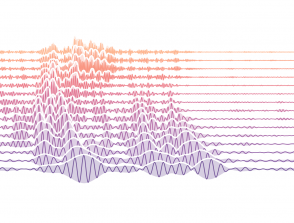Seismological Monitoring of Calving Events in Greenland : A Machine Learning Approach.
Début : 01 octobre 2019
Fin : 23 avril 2023
Encadrants :
Anne Mangeney, Clément Hibert
Équipes liées :
Sismologie
Statut : Soutenue
Greenland and other polar regions are highly sensitive to global warming. The impact of climate change on Greenland’s glaciers can be seen through an increase in calving events. To better understand this impact, it is important to quantify and document calving activity. However, direct observations are difficult to perform repeatedly over long periods of time due to the hostile climatic conditions, the lack of human witnesses and of the possibility to install in-situ sensors in these remote areas.
With the installation of a regional seismological network in Greenland in the 2000’ ,and the densification of the one in north-eastern Canada, seismic signals caused by large volume calving events, known as glacial earthquakes, were recorded at distances of hundreds of km from the source. These signals have a wide range of frequencies, making it hard to distinguish them from tectonic events, anthropogenic noise, and other natural noise. Using two catalogues of known events – one of 444 glacial earthquakes that occurred between 1993 and 2013, and one for 400 earthquakes that occurred during the same time period selected from USGC – we trained and tested a detection algorithm based on the STA/LTA method to extract event signals from continuous data. We then trained a supervised machine learning algorithm (Random Forest) to automatically classify these signals into two different classes : glacial earthquakes and earthquakes, with a probability of belonging to each class.
With a workflow designed to limit the false alarm rate based on the probability scores of each events, we finally analysed over 800 days of data from the Greenland regional seismic network and identified almost 1500 new glacial earthquake events using the trained machine learning model. Our detection methods make it possible to detect four times more ice-quake than the original catalogue.





